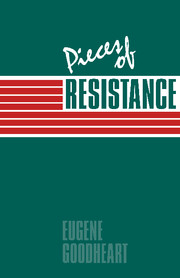Book contents
- Frontmatter
- Contents
- Preface
- Acknowledgments
- Autobiographical
- Part I Critics and criticism
- Part II Contemporary culture in conflict
- Part III Writing in America and elsewhere
- 13 The New Country: Stories from the Yiddish About Life in America
- 14 Three Novels, by Daniel Fuchs
- 15 The demonic charm of Bashevis Singer
- 16 The thirties revisited: Meyer Liben's Justice Hunger and Nine Stories
- 17 Bernard Malamud's A New Life
- 18 Ralph Ellison's Shadow and Act
- 19 William Styron's The Confessions of Nat Turner
- 20 Donald Barthelme's The Dead Father
- 21 Raymond Carver's Cathedral
- 22 Saul Bellow's Him with His Foot in His Mouth and Other Stories
- 23 The claustral world of Nadine Gordimer
20 - Donald Barthelme's The Dead Father
Published online by Cambridge University Press: 05 August 2012
- Frontmatter
- Contents
- Preface
- Acknowledgments
- Autobiographical
- Part I Critics and criticism
- Part II Contemporary culture in conflict
- Part III Writing in America and elsewhere
- 13 The New Country: Stories from the Yiddish About Life in America
- 14 Three Novels, by Daniel Fuchs
- 15 The demonic charm of Bashevis Singer
- 16 The thirties revisited: Meyer Liben's Justice Hunger and Nine Stories
- 17 Bernard Malamud's A New Life
- 18 Ralph Ellison's Shadow and Act
- 19 William Styron's The Confessions of Nat Turner
- 20 Donald Barthelme's The Dead Father
- 21 Raymond Carver's Cathedral
- 22 Saul Bellow's Him with His Foot in His Mouth and Other Stories
- 23 The claustral world of Nadine Gordimer
Summary
The Dead Father is a mock-epic voyage of a half-dead, half-alive, part-mechanical being who, by means of a cable, is dragged by nineteen men through an indeterminate milieu called the country of the Wends. The goal is the mysterious Great Father Serpent, and the action consists mostly of odd, fragmentary transactions between the Dead Father and his children and between the children themselves. Events are presented rapidly and graphically, but since the logical thread of narrative has been snapped, they come at us apparently devoid of meaning or pregnant with undisclosed meaning. Not only is the rhetorical element absent (except perhaps as parody), but so is the explanatory function of narrative. One consequence is a release from moral responsibility: an event is in a free, irresponsible juxtaposition to what follows and what goes before, the effect of which may be grotesquely funny or horrific.
In epic fashion, there are stories within the story. At a campfire, the Dead Father asks Thomas to tell a story. “One day in a wild place far from the city four men in dark suits with shirts and ties and attaché cases containing Uzi submachine guns seized me, saying that I was wrong and had always been wrong and would always be wrong and they were not going to hurt me. Then they hurt me, first with can openers then with corkscrews. Then, splashing iodine on my several wounds, they sped with me on horseback through the gathering gloom.”
- Type
- Chapter
- Information
- Pieces of Resistance , pp. 158 - 161Publisher: Cambridge University PressPrint publication year: 1987



